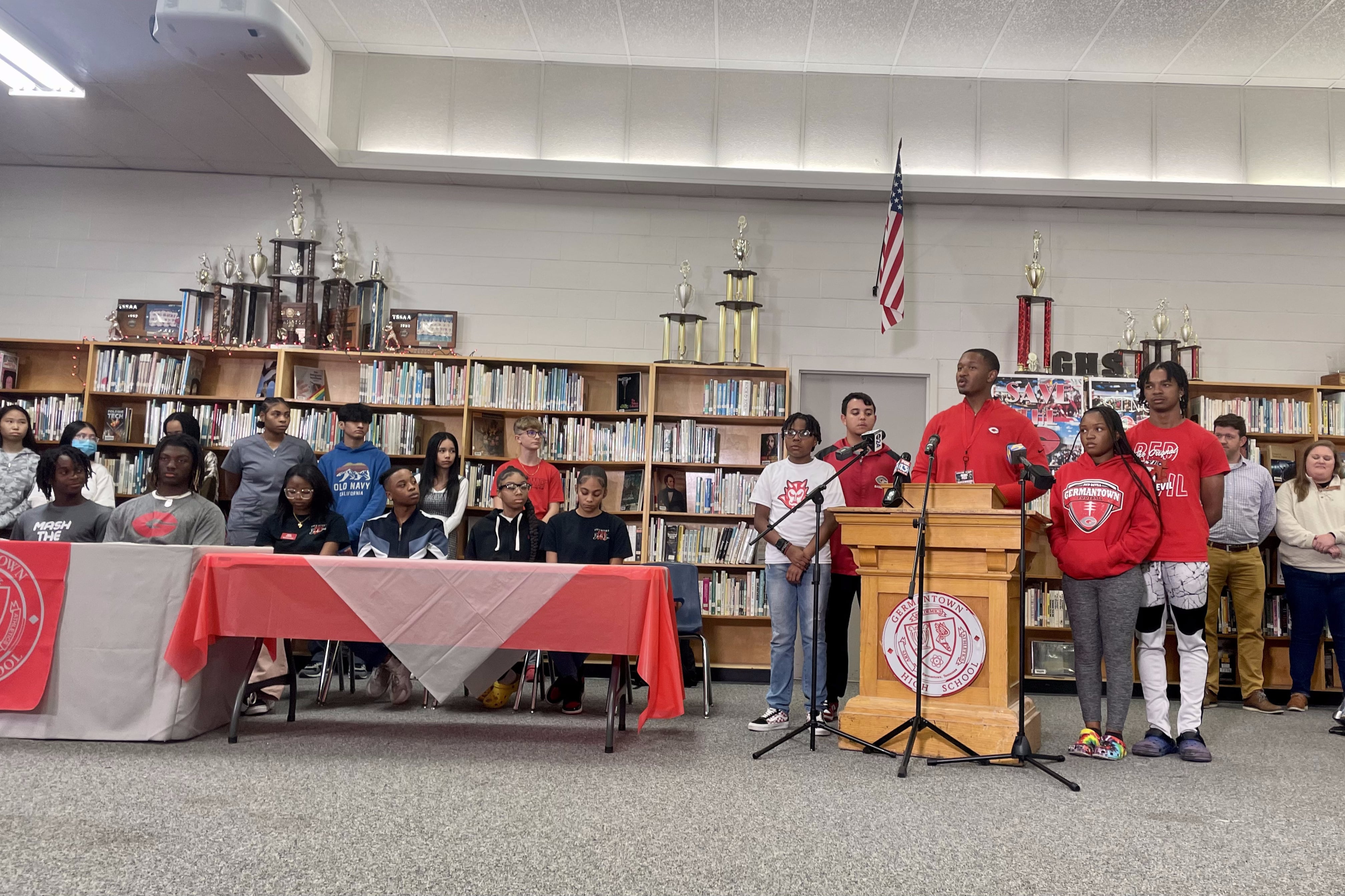After three years at Germantown High School, Maya Logan has come to think of it as home — a place where she’s made friends who are more like family, that has helped her learn and grow in immeasurable ways. She dreams of being at graduation in a couple of years, surrounded by the friends and educators who shaped her high school experience.
But that dream remains at risk if Memphis-Shelby County Schools and the neighboring Germantown Municipal School District can’t reach an agreement on the future of her school.
And time is running out.
A new state law requires MSCS to cede ownership of three schools — Germantown high, middle, and elementary schools — to the Germantown district, unless the districts strike an agreement by the end of the school year.
More than 4,000 students might be affected by the outcome, which some fear could involve a decision to close the schools entirely and send their students elsewhere. And at a press conference Thursday, several of these students spoke out for the first time about the long-running dispute over schools operated by MSCS in Germantown and other suburbs that created their own school systems after Memphis and Shelby County school systems merged in 2013.
“I’m waiting for the day that I can walk across the stage and say that I made it,” Logan said at the press conference, which she organized with over 20 other students in the school’s library. “And I hope that I will be wearing red and white when that day comes.”
The law, passed this spring, says a county school district can’t operate a school within the geographic boundaries of a municipal school system, unless the two districts negotiate otherwise. It affects the three Germantown schools — known as the “three G’s” — as well as Lucy Elementary, which is operated by MSCS but is located within Millington Municipal Schools boundaries. It set a July 2023 deadline for the districts to negotiate a settlement.
“We hope an agreement can be reached before that date that keeps our students in their school or provides enough upfront funding and time to construct the type of building our students deserve,” MSCS said in a statement after the press conference.
A Germantown spokesperson said Friday that the district has not met with MSCS to develop transition plans for the three schools, but “welcomes discussions” with MSCS leaders.
As MSCS holds community meetings for the families affected by the law, “we decided as a student body that now is the time for us to stand up,” said Calvin Nicholson, a student government leader representing Germantown High’s ninth grade class. “It was time for us to take our place and let our voices be heard.”
Germantown school officials have sought the expansive campuses of the three schools for a decade. But leaders of MSCS, which has operated the three G’s since the merger under a legal settlement with Germantown, have argued that the suburban district has offered no long-term plan for the thousands of students who could be displaced if ownership of the schools shifts.
MSCS leaders have said that underlying the tug-of-war between the districts are racial and class divisions. Most of the students at the three Germantown schools are Black, and about a third are considered economically disadvantaged. Most students attending Germantown district schools, meanwhile, are white, and just 5% come from low-income families.
Most of the three schools’ students live in unincorporated areas near Germantown, outside the suburb, or have chosen to attend the schools through MSCS’ optional schools program. Optional schools serve a mix of students who are zoned to the building and those who enroll into the school because it caters to unique interests and learning styles.
Germantown Elementary offers an international studies program, the middle school boasts a college preparatory program, and the high school has both a creative arts and performing arts program, as well as an International Baccalaureate diploma program. If the school were to shift to another owner or close, opponents of the law wonder, where would students find similar opportunities?
Many of the Germantown High School students who organized Thursday’s press conference said they came to the school because of its specialized programs.
For Ronald Webster, it was Germantown High School’s award-winning media program that he says he helped him find his “place” in school — and in life. The loss of such a program and the opportunities it provides to students would be a “humongous waste,” Webster told reporters Thursday.
Chandler Harley said Germantown’s criminal-justice pathway has been a life-changing experience that has prepared her for life after high school.
“Our city needs people who want to succeed,” Harley said.
Nicholson, the ninth-grade leader, said he’s met great friends and teachers in the couple months since he started at Germantown High.
He doesn’t want the experience to end after just one year.
“Germantown offers so much to the students, so much to incoming students, and so much to the world as a whole,” Nicholson said. “I can truly say it’s changed my life.”
Samantha West is a reporter for Chalkbeat Tennessee, where she covers K-12 education in Memphis. Connect with Samantha at swest@chalkbeat.org.






